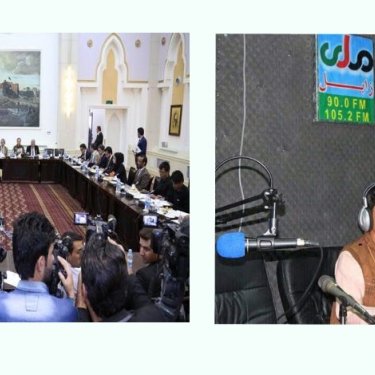RSF decries wave of violence against Afghan journalists and media

Reporters Without Borders condemns the increase in violence against journalists and media outlets in Afghanistan. The war imposed by the Taliban is the main reason for the violence but local authorities, the military and police are contributing to the climate of fear for media personnel.
RSF was saddened to learn that Mohammad Yaqub Sharafat, a 23-year-old journalist who had worked for the Afghan national public radio and TV broadcaster for the past two years, was shot dead in his car as he was driving home in Qalat, the capital of the southern province of Zabul, on 17 October.
His murder was widely condemned by journalists’ associations and officials. Zabul police chief Mirvias Norzai told reporters that two suspects have been arrested.
The increase violence in several provinces has fuelled tension between journalists and local authorities. Many governors and local officials do not respect journalistic independence. 50
cases of threats and physical violence against journalists
by local officials, their bodyguards, police officers and the Taliban in several provinces including Mazar-e-Sharif, Kandahar, Herat, Ghazni and Kabul.
The police and judicial authorities, who are susceptible to being influenced by governors, often interrogate and even punish journalists. Recent victims include Ahmad Wali Sarhad, a freelancer working for the Zabultimes website, who was harassed for months by the police.
His problems began when the Zabul prosecutor’s office issued a warrant for his arrest after he wrote that a transport ministry official was probably collaborating with the Taliban. He blamed the harassment on the governor’s influence, although the governor’s office denied any role in the case.
Police and soldiers have also been involved in several recent cases of violence against journalists. During a visit by President Ashraf Ghani to Bamiyan, 250 km northwest of Kabul, on 29 August, ten journalists were beaten or mistreated by his bodyguards or by police officers from Kabul.
Some of these journalists were there as demonstrators but the others were there to cover the president’s visit. The president’s office issued a statement the next day apologising for the way the police behaved towards journalists and promising an investigation into the violence. The investigation’s findings have yet to be published.
In Nili, the capital of the central province of Daykundi, a homemade bomb attack on Radio Nasim on the night of 11 October caused considerable damage but no injuries, station manager Mohammad Reza Vahedi reported.
A few hours before the bombing, two unidentified men went to Vahedi’s home, threatened him and beat him. “They told me to watch what I said on the radio and to think of my child and my wife,” he told the police, who waited until the next day to come and begin an investigation.
Radio Nasim was previously the victim of harassment and reprisals by the governor, the police chief and local representatives of the information and culture ministry in February 2013.
Journalists’ safety – precondition for Taliban talks
According to several media outlets, including the Guardian, AFP and Tolonews, two rounds of talks have been held in recent weeks in Doha between representatives of the Afghan government and the Taliban, who have an office in Doha. The reports said a senior US diplomat attended the talks.
RSF reiterates its position that the Afghan government and international community should condition any negotiations with the Taliban on an explicit prior commitment to respect basic international treaties, starting with the Geneva Conventions.
The first meeting of the Committee for the Safety of Journalists was meanwhile held at the presidential palace in Kabul on 2 October. Consisting of government officials and representatives of journalists’ associations and tasked with coordinating efforts to protect journalists, the committee decided at this meeting to create a series of sub-committees, including provincial sub-committees.
RSF has long supported the committee’s formation and its creation was one of RSF’s recommendations at the conference on “Security for Journalists and Afghanistan’s ranking in the World Press Freedom Index” that was held in Kabul on 8 November 2015.
Attended by government officials as well as representatives of journalists’ associations and news media, the conference was organized jointly by RSF and the Afghan Journalists Safety Committee (the local branch of International Media Support).
Afghanistan is ranked 120th out of 180 countries in RSF’s 2016 World Press Freedom Index.



